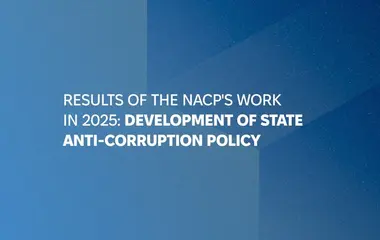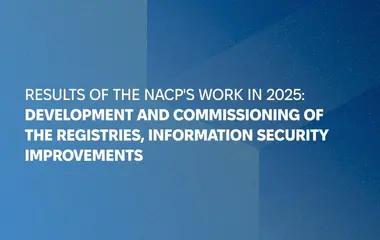State bodies, enterprises, institutions, organisations, and local self-government bodies must establish independent units or appoint officials responsible for implementing the anti-corruption programme and ensuring the organisation of measures to prevent and detect corruption. These are anti-corruption commissioners (AC-commissioners).
The list of bodies and institutions where such a unit is formed can be found in Article 13-1 of the Law of Ukraine ‘On Prevention of Corruption ’ (hereinafter - the Law).
It is the AC Commissioner, as the primary element of prevention of corruption in the organisation, who is primarily responsible for creating an effective system for preventing conflicts of interest, their timely detection and settlement.
The main tasks of the AC Commissioner related to the prevention and settlement of conflicts of interest:
- Providing methodological and advisory assistance on compliance with the legislation on prevention and settlement of conflicts of interest, compliance with restrictions on prevention of corruption.
- As part of this task, the Commissioner helps employees determine whether they have a conflict of interest or not. If in doubt, he/she provides advice on compliance with restrictions on receiving gifts, combining work and other activities, etc.
The AC Commissioner is the first person to whom an employee may seek advice on a conflict of interest. Therefore, it is recommended to seek clarification from the NACP only if the Commissioner cannot provide advice (due to the exceptional complexity of the issue, temporary absence of the Commissioner, etc.)
At the same time, the AC Commissioner is obliged to assist the employee in filing an appeal to the NAPC and explain what information should be provided to the National Agency to obtain a meaningful explanation.
- Taking measures to identify conflicts of interest and facilitate their resolution.
- Timely detection and settlement of conflicts of interest helps prevent employees from committing corruption and corruption-related offences. Therefore, this is one of the most important tasks of the AC Commissioner. The AC Commissioner may point out to the employee the risk of a conflict of interest (for example, to prevent close relatives from working together or the employee from making decisions about himself/herself) and take measures to prevent it, and if a conflict of interest has already arisen, to ensure its timely settlement. In doing so, the AC Commissioner
- advises the person on possible ways to resolve the conflict of interest independently and on choosing the most favourable one, and controls the independent resolution of the conflict of interest;
- advise on the content and procedure for reporting a conflict of interest;
- provide recommendations to the appropriate level manager on the best way to resolve the conflict of interest in a particular situation.
- The AC Commissioners are obliged to inform the NACP about the identification of a conflict of interest and the measures taken to resolve it.
Important: Violation of the requirements for prevention and settlement of conflicts of interest, as well as other anti-corruption restrictions by an official may result in administrative, disciplinary, and even criminal liability.
- Informing the head of the relevant body, the NAPC or other specially authorised entities in the field of anti-corruption of the facts of violation of the legislation on preventing and combating corruption.
If it was not possible to prevent the employee from committing a corruption or corruption-related offence, the AC Commissioner is obliged to ensure conditions for taking response measures provided for by law, analyse and eliminate the causes and conditions that contributed to the commission of the offence. To perform this task, the AC Commissioner should be provided with appropriate powers and tools (ensuring the functioning of the corruption reporting channels provided for by the Law and their proper consideration, the Commissioner's access to information and documents, the right of the Commissioner to receive explanations from employees, initiate internal investigations, etc.)
In case of detection of offences subject to disciplinary liability, the AC Commissioner initiates the issue of bringing a person to justice.
Upon detecting an administrative offence, the authorised person should inform the NACP or the National Police of Ukraine.
In certain cases, actions or decisions taken in the context of a conflict of interest may have signs of a corruption offence. In this case, the AC Commissioner shall inform the relevant pre-trial investigation body.
To assist the AC Commissioners, the NACP has developed a Guideline where you can find explanations and tools on, among other things
- how the Commissioner can find out about an existing conflict of interest among employees and how to resolve it;
- norms and requirements of the Law of Ukraine ‘On Prevention of Corruption’;
- links to documents, open databases and registers that will be useful in the work of the AC Commissioners.









